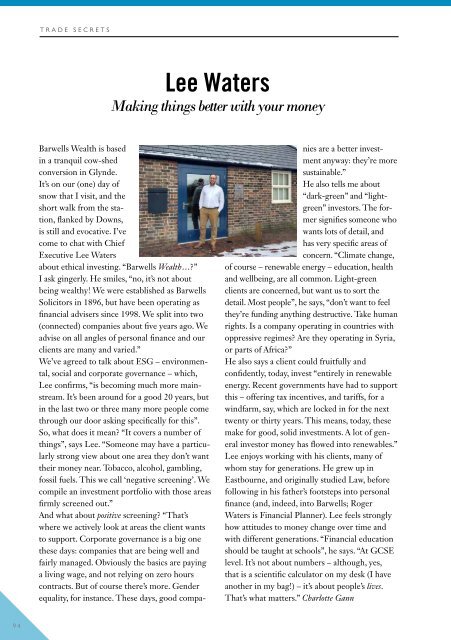Viva Lewes Issue #150 March 2019
You also want an ePaper? Increase the reach of your titles
YUMPU automatically turns print PDFs into web optimized ePapers that Google loves.
TRADE SECRETS<br />
Lee Waters<br />
Making things better with your money<br />
Barwells Wealth is based<br />
in a tranquil cow-shed<br />
conversion in Glynde.<br />
It’s on our (one) day of<br />
snow that I visit, and the<br />
short walk from the station,<br />
flanked by Downs,<br />
is still and evocative. I’ve<br />
come to chat with Chief<br />
Executive Lee Waters<br />
about ethical investing. “Barwells Wealth…?”<br />
I ask gingerly. He smiles, “no, it’s not about<br />
being wealthy! We were established as Barwells<br />
Solicitors in 1896, but have been operating as<br />
financial advisers since 1998. We split into two<br />
(connected) companies about five years ago. We<br />
advise on all angles of personal finance and our<br />
clients are many and varied.”<br />
We’ve agreed to talk about ESG – environmental,<br />
social and corporate governance – which,<br />
Lee confirms, “is becoming much more mainstream.<br />
It’s been around for a good 20 years, but<br />
in the last two or three many more people come<br />
through our door asking specifically for this”.<br />
So, what does it mean? “It covers a number of<br />
things”, says Lee. “Someone may have a particularly<br />
strong view about one area they don’t want<br />
their money near. Tobacco, alcohol, gambling,<br />
fossil fuels. This we call ‘negative screening’. We<br />
compile an investment portfolio with those areas<br />
firmly screened out.”<br />
And what about positive screening? “That’s<br />
where we actively look at areas the client wants<br />
to support. Corporate governance is a big one<br />
these days: companies that are being well and<br />
fairly managed. Obviously the basics are paying<br />
a living wage, and not relying on zero hours<br />
contracts. But of course there’s more. Gender<br />
equality, for instance. These days, good companies<br />
are a better investment<br />
anyway: they’re more<br />
sustainable.”<br />
He also tells me about<br />
“dark-green” and “lightgreen”<br />
investors. The former<br />
signifies someone who<br />
wants lots of detail, and<br />
has very specific areas of<br />
concern. “Climate change,<br />
of course – renewable energy – education, health<br />
and wellbeing, are all common. Light-green<br />
clients are concerned, but want us to sort the<br />
detail. Most people”, he says, “don’t want to feel<br />
they’re funding anything destructive. Take human<br />
rights. Is a company operating in countries with<br />
oppressive regimes? Are they operating in Syria,<br />
or parts of Africa?”<br />
He also says a client could fruitfully and<br />
confidently, today, invest “entirely in renewable<br />
energy. Recent governments have had to support<br />
this – offering tax incentives, and tariffs, for a<br />
windfarm, say, which are locked in for the next<br />
twenty or thirty years. This means, today, these<br />
make for good, solid investments. A lot of general<br />
investor money has flowed into renewables.”<br />
Lee enjoys working with his clients, many of<br />
whom stay for generations. He grew up in<br />
Eastbourne, and originally studied Law, before<br />
following in his father’s footsteps into personal<br />
finance (and, indeed, into Barwells; Roger<br />
Waters is Financial Planner). Lee feels strongly<br />
how attitudes to money change over time and<br />
with different generations. “Financial education<br />
should be taught at schools”, he says. “At GCSE<br />
level. It’s not about numbers – although, yes,<br />
that is a scientific calculator on my desk (I have<br />
another in my bag!) – it’s about people’s lives.<br />
That’s what matters.” Charlotte Gann<br />
94


















